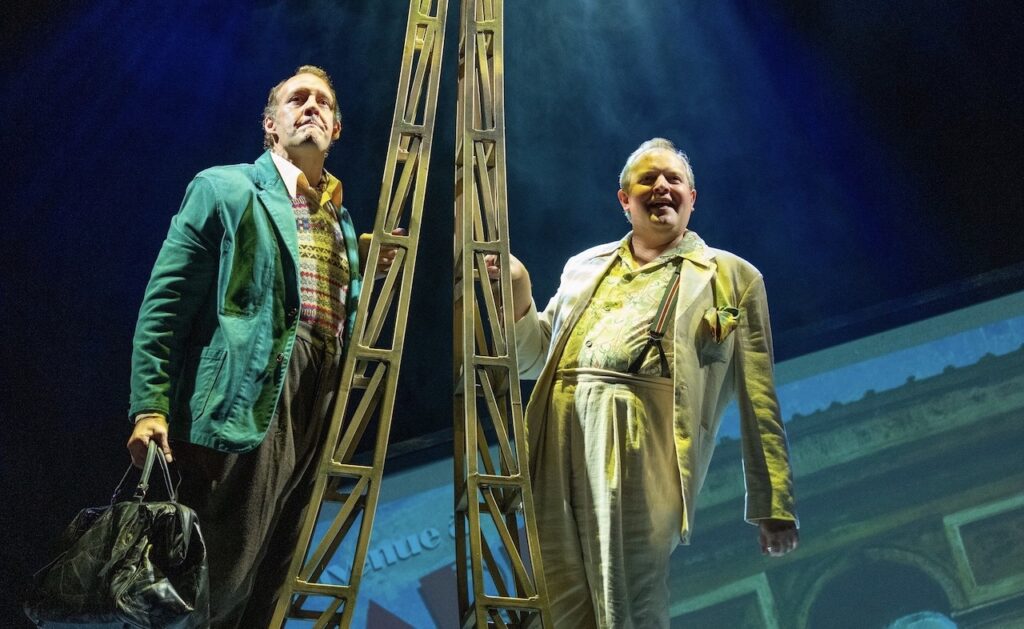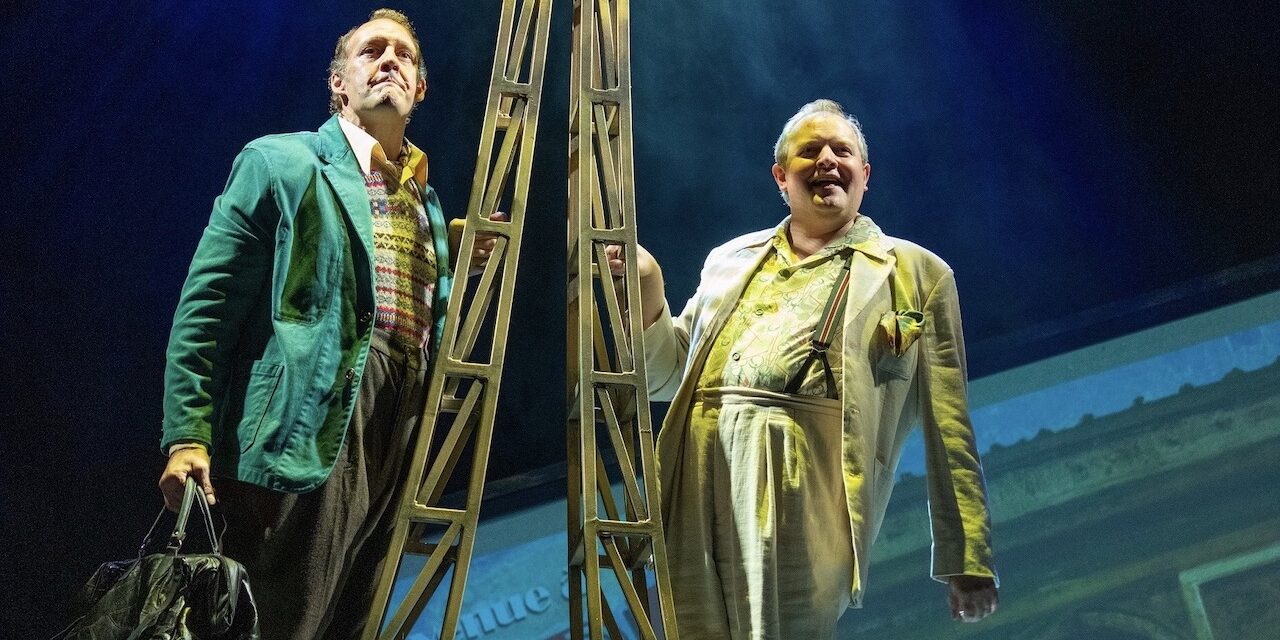
Acclaimed comedy actors Miles Jupp (A Very British Scandal, The Durrells, Watership Down, Rev.) and Justin Edwards (This England, 1917, The Thick of It, The Ferryman) are set to star in The Lavender Hill Mob in Bath at the start of February. We catch up with them ahead of the Ealing comedy’s arrival at the Theatre Royal.
What are audiences in store for when they come to see the show?
Justin: It’s a very enjoyable romp and a nice escapist bit of storytelling. It’s not a knockabout farce as such because Ealing comedies are quite gentle, so I’d say it’s gentle escapist fun. It’s not political and no parallels are drawn with modern society or anything terribly clever like that. Audiences so far have reacted really positively to it.
Miles: I’d describe it as a caper. It makes for a really fun evening, or an afternoon if you’re a matinee person. There’s a mixture of people who come along to see it. There’s the people who always go to the theatre, of course, plus others who are fans of the film and those who are attracted by the idea of it, so it’s a nice blend and the audiences have been lovely.
How would you sum up your respective characters and their role in the story?
Miles: Henry Holland is a fastidious guy and a planner, a sort of details man, but he becomes restless and ultimately uses his attention to detail for nefarious means – namely a bank robbery. He’s a lot of fun to play, especially if you like lots of words, which I do.
Justin: Alfred Pendlebury is an artist who aspires to greater things but who has ended up making tat – souvenirs and that kind of thing – which he feels is a bit beneath him. Then when he meets up with this man who has a plan to raid the Bank of England and steal a million pounds’ worth of gold bullion he jumps at it. They’re both single men in post-war Britain, stuck in dead-end jobs, staying in a cheap boarding house in Lavender Hill and thinking ‘This is what life is gonna be now’, so naturally they seize on this life-changing experience.
The film has been hailed by the BFI as “the greatest British film of all time”. Were you already familiar with it before doing the play?
Justin: I’m a big fan of the Ealing comedies, so yes I already knew it. The film is 71 years old and it does show its age at certain points, just in terms of the pacing and style, but it still stands up well.
Miles: I’m also a big fan of the Ealing films and with The Lavender Hill Mob there’s a jolliness to it. People enjoy a heist and the film, along with the play, is a jolly one.
Have you avoided re-watching Alec Guinness and Stanley Holloway in the movie?
Miles: Yes, because you have to approach it as a new piece of writing that has to stand on its own two feet. Likewise, you don’t want to do an impression of someone else’s work.
Justin: It’s not meant to be a faithful re-enactment of their performances, it’s more a theatrical retelling of the story. There’s a lot of doubling up when it comes to the other characters and a lot of the male parts are played by women because of the way it’s staged. We’re putting our own twist on it.
What do you like about working together?
Miles: Justin makes me laugh an enormous amount. He’s also a very calm, practical guy with a good sense of what works for comedy, what doesn’t and why. He’s great company.
Justin: It’s very easy to make Miles laugh. I try and do that at every possible opportunity on stage. [Laughs] We know which buttons to push to both anger and amuse each other. Performing with him is a very amiable process.
Is this your first time working with acclaimed director Jeremy Sams and how is the experience?
Miles: I’ve tried to work with him twice before but the dates didn’t line up. Jeremy is great because he’s so enthusiastic and at the end of the day he says ‘Thank you all for doing such nice work’. That means a lot.
Justin: This is the first time we’ve worked together but I’ve been aware of him ever since he was a musical director at the RSC and places like that. It’s interesting how that affects his directing in terms of the rhythm of the piece.
Why do you think The Lavender Hill story continues to captivate audiences?
Justin: It’s slightly daft and it’s resolutely set when it’s set, so you couldn’t really update it. What’s nice is that it takes people back to post-war Britain, when things were a bit bleak but there were glimmers of ‘Is the world going to be a better place and how will we manage after the country has been depleted?’ It’s also nice to see a little man like Henry Holland, who is this unassuming clerk, become a criminal mastermind.
Miles: Again, it’s the heist element that appeals to people and the idea of good guys doing bad things. It’s not a story that starts with somebody being released from prison and deciding what the next job is; it’s about somebody who has had a responsible job for 20 years, then decides it’s time for some adventure. There’s a slight everyman aspect to it and setting it in the 1950s makes it escapism.
What makes it distinctly British?
Justin: It’s got that Ealing comedy sensibility, with a particular set of morals to it, and it’s set in London. It features stiff-upper-lip British types, bank managers and so forth, along with salt-of-the-earth cockneys. There are clear goodies and baddies, loveable rogues and what have you all cavorting around London and then Paris.
Miles: It’s about what we in Britain class as an underdog, a non-entity as Henry Holland describes himself. He’s a peculiarly British type of hero and wearing high-waisted trousers and using some needlessly florid language is my idea of nice work.
What have you most enjoyed about taking the show around the country so far?
Justin: It’s such a fun job and it’s a lovely ensemble company of actors. You’re in a different theatre every week, the acoustics are different, the sightlines are different and you have to rejig things as you go, restaging things for different venues. It keeps it fresh, as opposed to when you’re doing the same play in the same place for months on end. It feels like a different show every week and it’s been lovely seeing different parts of the country post-lockdown opening up again.
Miles: I like theatres and although it’s nice to go back to places that you already know I do like the idea of turning up somewhere you’ve never been to before, going to the theatre and there being an audience for you. The first time I did a stand-up tour that anybody came to see, around 2011, I remember turning up to a theatre in Swindon and there were 170 people there to see me on a Monday night. I just thought ‘Wow, that’s amazing, I don’t know anyone in Swindon and here’s 170 people who have come to hear me talk’. I still get that feeling now.
Is there anything you especially relish about live theatre versus filming?
Miles: I like the fact that it’s happening now and the sheer awake-ness you feel on the stage – that feeling of being completely in the moment. And I really like being part of a team, not just the team on stage but also the people behind the scenes, where a lever is being pulled or a piece of rope is being yanked down on. It’s a group of people working together at the same time to the same end, and I really like that aspect of it.
Justin: The immediacy of theatre is very nice and you can make quick decisions, like ‘Let’s try that joke this way tonight’ and it either succeeds or it doesn’t. And as I say you’re in a different venue with different audiences so the show is never exactly the same. It keeps you match-fit and on your toes, whereas filming is about hanging around all day then doing concentrated periods of work for five minutes at a time.
The tour calls at Bath’s Theatre Royal. Does it have any significance for you?
Justin: Bath is lovely, as is the Theatre Royal. It feels like a suitable venue for this show and it’s always nice to revisit the haunts of Bath, plus the audiences are really loyal.
Miles: We used to go on family holidays to Bath and it’s absolutely beautiful. I find it such a nice place to explore on foot and, as Justin says, they have such loyal audiences at the Theatre Royal.
The Lavender Hill Mob appears at the Theatre Royal Bath from Monday 6th February to Saturday 11th February. To book tickets call the Theatre Royal Bath Box Office on 01225 448844 or visit www.theatreroyal.org.uk
Photo credit: Hugo Glendinning


